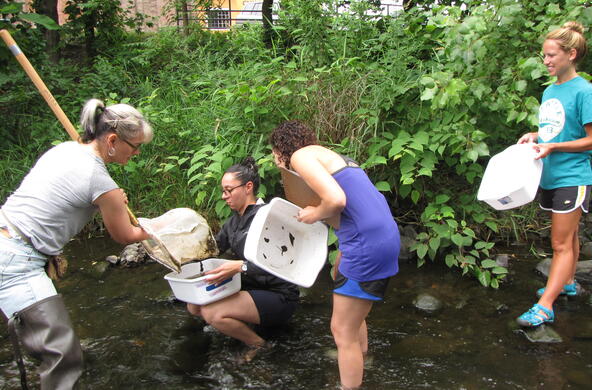If I had to describe the Fundamentals of Ecosystem Ecology (FEE) course at the Cary Institute in one word, I would use “connectivity.” The connections I developed from attending the course started from within as I found myself deeply reflecting on my identity as an emerging ecologist, and extended outward in the strong relationships I built with peers and mentors from diverse backgrounds. Further, the course’s “ecosystem approach” emphasized the need to investigate the connectivity between the diverse components of an ecosystem when studying ecology.
I was drawn to the FEE course last January because I wanted a broader and more comprehensive understanding of ecosystem ecology than the way it is traditionally taught. As a PhD student whose research integrates animal behavior with community and ecosystem ecology, I was eager to find a course that synthesized these ecological subdisciplines to understand how a whole ecosystem functions. Commonly, ecosystem ecology courses only describe the processes of energy and material flow and predominantly focus on how humans change these processes. However, this approach dissolves the remaining components of an ecosystem and ignores the important interactions between individuals, populations, communities, and their non-living environments. I was excited to learn that the FEE course provides a deeper understanding of ecosystem science that would encourage the connection of subdisciplines of ecology and support research that crosses traditional boundaries.

Learning about the “ecosystem approach” conceptual framework from the founder of the Cary Institute of Ecosystem Studies, Dr. Gene Likens, impacted how I currently explore my research questions. He explained that ecologists lately dissect an ecosystem, focusing only on the individual level, for example, or only populations. However, Dr. Likens shifted our focus to investigating how all these pieces connect within a boundary of a defined habitat. To truly understand ecology under the ecosystem approach, one must connect these different levels of biological organization back together and study the relationships among individual organisms, populations, systems, and their environments. Since my research interests aim to integrate subdisciplines of ecology, from population-level behavioral traits to community dynamics and ecosystem functions, this advice from Dr. Likens has changed the way I investigate and communicate my research interests.
Throughout the course, we continued to build upon our understanding and utilization of the ecosystem approach framework through lectures, readings, group discussions, and exercises. We learned how to utilize an ecosystem approach way of thinking beyond just scientifically studying ecosystems in the wild, applying it to urban environments, ecological education, and scientific communication. These unique ways of practicing an ecosystem approach mentality allowed me to better incorporate a whole-system way of thinking in several aspects of my life, beyond ecology.

The best part about the FEE course is the diverse cohort of graduate students with whom I built close friendships and plan to collaborate in the future. Graduate students in my FEE cohort came from wide-ranging disciplines, including social and urban science, organismal biology, community ecology, and biogeochemistry. Regardless of their research focus, each student was fascinated with bringing this holistic perspective to their ecosystem of interest. In parallel, course mentors and scientists at Cary Institute each defined their research ecosystem of interest differently, ranging from a lake to a city or a global pandemic. Across these different types of ecosystems, Cary scientists used an ecosystem approach framework by synthesizing several components of their system to answer their questions.

The main point of this course is not to teach about the detailed steps of the nitrogen or carbon cycle, although these processes are broadly discussed. Instead, this course will teach you how to expand your theory of ecological knowledge by learning how to properly define your ecosystem of interest and deeply investigate its many connected parts.
The ecosystem approach framework is one that I continue to use in my research on the linkages between animal behavior and ecosystems. The FEE course motivated me to present at a session in the Society for Freshwater Science 2023 conference in Brisbane, Australia. Previously, I would have felt nervous to present in the Biogeochemistry session. However, the ecosystem approach framework provided me with the language to address the need to reconnect animal behavior with ecosystem ecology. My oral presentation was met with much support from an audience of leading ecosystem ecologists — including several graduate students from my FEE course! This meant the world to me, because regardless of being thousands of miles away from home and several months since we had last seen each other at Cary Institute, I still found support from the FEE community. Not much had changed between us, other than the advancements in our research, which we were eager to learn about at each other’s posters and presentations.
My FEE cohort will always be dear to me, and I am certain that future collaborations will arise as we advance in our careers. The connections that I made at FEE are only the start of the ecosystem that we are building together as the next generation of emerging ecologists.






